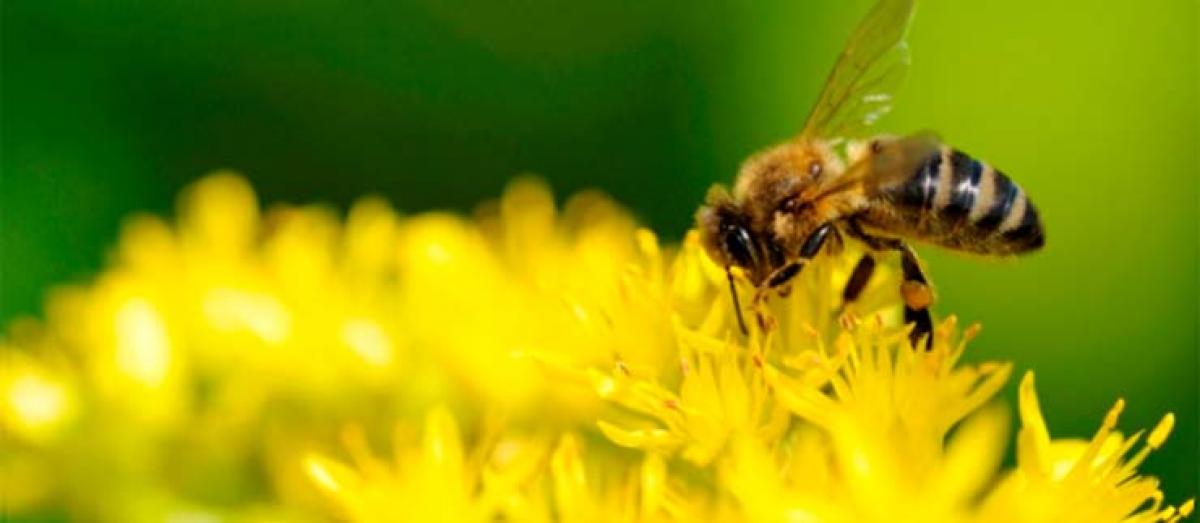Live
- President Murmu to leave on first-ever visit by Indian head to state to Algeria, Mauritania, Malawi tomorrow
- 3rd T20I: Samson’s ton; Suryakumar’s 75 take India to highest-ever score of 297/6
- Mulayam Singh’s soul must be in pain due to Akhilesh's support for Cong: JD-U
- Scientists find new brain target for anxiety disorders
- We're patriots protecting India's integrity, not terrorists: BJP leader responds to Kharge
- Yamaha Commits to Expand Green Cover by 6,000 sqm in Greater Noida
- Another Milestone, Another Benchmark: FRONX hits fastest 2 lakh sales* in passenger vehicle category
- Oxford University Press adds 13th Indian language to its dictionary portfolio
- Toyota Kirloskar Motor Introduces Urban Cruiser Hyryder ‘Festival Limited Edition’
- Muslim religious leaders oppose call to close Madrasas, cite Supreme Court order
Just In
Advertisement and Business Success – Learn the Truth from Pollinators

28 Aug 2015 4:43 PM IST

x
Highlights
Will more advertisement on any product really generates more business? These days, most corporate invests heavily on advertisements, with a conviction that advertisement would earn then big business returns. This working style or the approach is widely followed by the FMCG industries across the globe. The FMCG industries aggressively promote their products through such an approach both in print, audio and visual media.
Will more advertisement on any product really generates more business? These days, most corporate invests heavily on advertisements, with a conviction that advertisement would earn then big business returns. This working style or the approach is widely followed by the FMCG industries across the globe. The FMCG industries aggressively promote their products through such an approach both in print, audio and visual media.
.jpg)
The question is, do consumers easily get influenced by such advertisements or their purchase choices are highly rationale and scientific. Consumers may get tempts once and may purchase the products may be once. But the repeat purchase of any products is definitely determined by the quality and how the ‘products’ meets/fulfill the consumer needs. Otherwise, the consumers may not re-visit the products again. Irrespective of the cost of the ‘product’, whether, it is costly or cost-effective.
Corporate and the business ‘pundits’ might have gained this ‘wisdom’ recently, but the nature knows this management principle even during the creation of wide variety of flowering plants. It means, nature knew this principle several thousand million years ago. The message to be remembered is that while giving advertisement, keep the quality and how authentic is the promise in meeting the needs of the consumers.
This truth is known to all the flowering plants that are pollinated by several insects. The flower that offer ‘more’ nectar are the one, attract the insects competitively. For the pollination event to occur, just the ‘visit’ of the insects to the flower is not enough, the insect must stay and move around within the flower, only then the complete transfer and or the collection of pollen grains would occur. Having very little nectar in the flower may not help the plant to keep the interest of the insect to the flower for a longer duration of time and hence the flowers have to have sufficient quantity of nectar for the pollinators.
Research studies have proven that the flowers of many plants produce nectar again, if it was removed artificially. That means, when the insect draws the nectar, they do get nectar again from the same flower. Since the nectar is continuously available, the insect would prefer to stay in the flower and move around for longer duration of time.
In some flowers, nectar replacement doesn’t seem to occur. From such plants, when the nectar is removed, although the insects may visit them but quickly recognizes that the nectar is not available. Hence, the insects quickly move away from it without doing the job of pollination for the plant.
Consumers can be easily compared with such pollinating insects. Insects visit flower after flower only for nectar. Whenever they see a flower, they move towards them. If the nectar is not there, they reject such flowers. The beauty of flowers although catch the attention of the insects but they primarily come for nectar or pollen grains only. Similarly, the consumers buy a product only with a purpose or need in mind.
Corporate should realize that advertisements will do little if the product lacks quality and superiority. If they think that they can ‘buy’ consumers through eye catching advertisements, they are terribly mistaken.
Look at the nature; you can learn many things for your business success and business planning. Let nature be your management teacher.
Dr S Ranganathan

Next Story
More Stories
ADVERTISEMENT
© 2024 Hyderabad Media House Limited/The Hans India. All rights reserved. Powered by hocalwire.com






